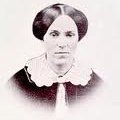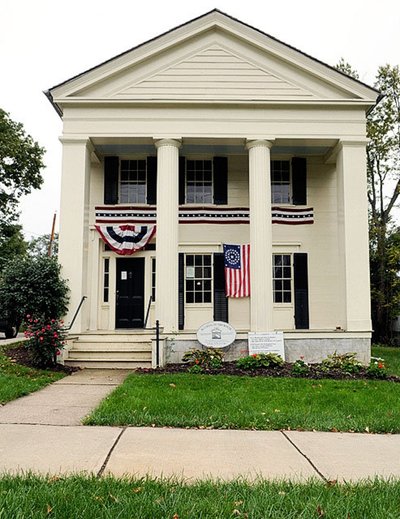- By Mayor Poulin
- News
 Print
Print  Matilda Joslyn GageA pleasant day trip is visiting the home of suffragist, abolitionist and defender of the Haudenosaunee (Iroquoit), Matilda Joslyn Gage (1826-1898). This historic home, of both Matilda and Henry H. Gage (1854-1898), reopened April 9, 2011, after a million-dollar restoration.
Matilda Joslyn GageA pleasant day trip is visiting the home of suffragist, abolitionist and defender of the Haudenosaunee (Iroquoit), Matilda Joslyn Gage (1826-1898). This historic home, of both Matilda and Henry H. Gage (1854-1898), reopened April 9, 2011, after a million-dollar restoration. Each downstairs room depicts aspects of Matilda's life and the causes to which she was dedicated: women's rights, freedom for black slaves, treaty rights for Native Americans, also her setting in local history and her original Parlour, with Henry & Matilda's furniture, including a treasure chest of toys/etc.
She and Henry opened their home to "Freedom Takers," throughout their tenure there. It was one of only two stops for the Underground Railroad in the area.
Gage encouraged her son-in-law, L. Frank Baum, to write the "Wizard of Oz" stories she would hear him telling her grandchildren at bedtime -- eventually resulting in fourteen books on the land of Oz. In 1887, Baum and his wife Maud, Matilda and Henry's daughter, stayed several months at the Gage home, where Baum took photographs of its interior/exterior and gardens, upon which the recent restoration is, in part, based. The Gage home is the only place open to the public today where L. Frank Baum lived.
Matilda was a president and a vice-president, as were Elizabeth Cady Stanton and Susan B. Anthony at various times, of the National Woman's Suffragist Association, Gage, often as the Chair of its Executive Committee, which meant running the organization from her home for much of its twenty year existence,
Elizabeth Cady Stanton and Susan B. Anthony were frequent visitors to the Gage home, planning strategy to help women and black Americans. Susan even engraved her signature on one of the upstairs bedroom's window.
Matilda was the only suffragist who stood by Susan at her trial, in the then far away Canandaigua, after being arrested for voting in a Federal election in Rochester, N.Y.. Two years earlier, Matilda and nine other women attempted to vote in Fayetteville. Gage wrote several monographs, for instance, 'Women as Inventors', with her magnum opus being 'Women, Church and State', still widely sold and read today, in which she stresses the importance of religious freedom in America.
 Notice the circulular star design on the 34-Star American flag, used during the Civil War from 1861 to 1863. It was not until much later that the configuration of the stars in American flags was codified. Photographs by courtesy of Sally Roesch Wagner, Ph.D., Executive Director of the Matilda Joslyn Gage Center and Foundation.
Notice the circulular star design on the 34-Star American flag, used during the Civil War from 1861 to 1863. It was not until much later that the configuration of the stars in American flags was codified. Photographs by courtesy of Sally Roesch Wagner, Ph.D., Executive Director of the Matilda Joslyn Gage Center and Foundation.Gage, with Stanton, wrote the first three volumes of 'The History of Woman's Suffrage', with Anthony acting as the go-between with the publisher. Gage wrote articles tirelessly, eventually damaging her health, for well-known newspapers, such as the New York Tribune, and magazines throughout the US, encouraging the readers to help women (who had virtually no rights and under law were considered chattel of their husbands and fathers), blacks and Native Americans. She also travelled throughout the US, constantly presenting riveting speeches, many which we can read today. Her first speech, given in Syracuse at the National Woman's Rights Convention in 1852, and causing great excitement, was hailed by suffragist/abolitionist colleague Lucretia Coffin Mott and subsequently published and read widely.
"We need not expect the concessions demanded by women will be peaceably granted. There will be a long moral warfare before the citadel yields," she said in concluding her speech. "In the meantime, let us take possession of the outposts. The public must be aroused to a full sense of the justice of our claims. Beside the duty of educating our children, so as to make the path of right easy to their feet, is that of discussion, newspaper articles, petitions: all great reforms are gradual. Fear not any attempt to frown down the revolution already commenced. Nothing is a more fertile aid of reform than an attempt to check it; work on!"
Tours are offered Saturdays, 10 AM - 4 PM, and at other times by appointment. Visitors may also elect to have a Tea served either before or after their tour! The Gage Gift shop offers many interesting items relating to Gage, the Wizard of Oz and an assortment of heirloom items reminiscent of the 19th Century world revisited.
The Gage Home is located on Route 5/210 East Genesee Street, up the hill on the right, just after the Fayetteville 'Towne Center' Mall (the large Greek Revival house with four massive columns). Turn right and park on Walnut Street (after Warren Street also on the right).
v7i35



